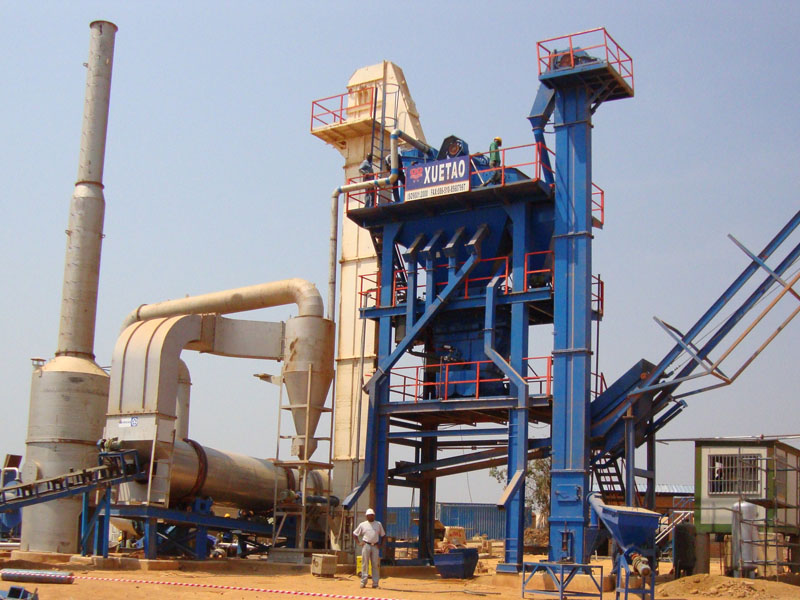Components of a Stationary Asphalt Mixing Plant
2024-07-15
A stationary asphalt mixing plant is a robust industrial machine used for the production of asphalt concrete. It's designed to mix aggregates, filler, and bitumen to produce hot mix asphalt (HMA) that is used for paving roads, highways, parking lots, and other surfaces. Here’s an overview of stationary asphalt mixing plants, their components, features, applications, and considerations:
Components of a Stationary Asphalt Mixing Plant
1. Cold Aggregate Feeding System:
- Feeder Bins: Multiple bins for storage and metering of different sizes of aggregates (such as stone, sand, and gravel).
- Conveyor Belts: Transport aggregates from the feeder bins to the drying drum.
2. Drying and Heating System:
- Drying Drum: Rotates to heat and dry aggregates to remove moisture before mixing with bitumen.
- Burner Unit: Provides heat to the drying drum, typically fueled by diesel, natural gas, or heavy oil.
3. Hot Aggregates Elevator:
- Bucket Elevator: Transports dried aggregates to the vibrating screen for further processing.
4. Screening and Mixing System:
- Vibrating Screens: Separate and classify aggregates based on size and remove oversized particles.
- Twin Shaft Paddle Mixer: Mixes aggregates with hot bitumen and filler materials to produce asphalt mixtures.
5. Bitumen Storage and Heating System:
- Bitumen Tanks: Store and heat bitumen (asphalt binder) to the required temperature for mixing.
- Thermal Oil Heating System: Maintains bitumen temperature during storage and transportation within the plant.
6. Dust Collection System:
- Baghouse Filter: Captures and filters dust and particulates from the drying and mixing processes to ensure compliance with environmental regulations.
7. Control System:
- PLC Control Panel: Monitors and controls all plant operations, including aggregate feeding, drying, mixing, and asphalt storage.
- Human-Machine Interface (HMI): Allows operators to set parameters, monitor production, and troubleshoot issues.
Features and Benefits
1. High Production Capacity:
- Continuous Operation: Capable of producing large quantities of hot mix asphalt continuously, suitable for high-demand projects.
2. Quality Asphalt Mixtures:
- Uniform Mixing: Ensures consistent and uniform mixing of aggregates, bitumen, and filler materials to meet specified asphalt quality standards.
- Temperature Control: Precise control over mixing temperatures to optimize asphalt performance and durability.
3. Versatility and Adaptability:
- Customizable: Configurable to produce various types of asphalt mixes (e.g., base, binder, surface) for different road construction applications.
- Modular Design: Allows for easy integration of additional components or upgrades to enhance plant capabilities.
4. Durability and Reliability:
- Robust Construction: Built with durable materials and components to withstand harsh operating conditions and ensure long-term reliability.
- Low Maintenance: Designed for minimal maintenance requirements, reducing downtime and operational costs.
5. Environmental Considerations:
- Energy Efficiency: Incorporates energy-efficient components and systems to reduce fuel consumption and greenhouse gas emissions.
- Emission Control: Includes advanced dust collection systems and emission controls to comply with environmental regulations.
Applications
1. Road Construction and Maintenance:
- Highways and Expressways: Produces asphalt mixtures for paving new roads, widening projects, and resurfacing existing asphalt surfaces.
- Urban Streets: Provides asphalt for city streets, intersections, and residential areas.
2. Infrastructure Projects:
- Parking Lots and Airports: Supplies asphalt for parking areas, airport runways, and taxiways.
- Industrial Facilities: Supports construction of industrial sites, warehouses, and logistics centers.
3. Specialty Applications:
- Sports Complexes: Supplies asphalt for athletic tracks, playgrounds, and sports courts requiring durable and smooth surfaces.
- Special Projects: Provides customized asphalt mixes for specific project requirements, such as noise reduction or high-traffic areas.
Considerations for Selecting a Stationary Asphalt Mixing Plant
1. Production Capacity:
- Output Requirements: Choose a plant size and capacity that matches anticipated production volumes and project timelines.
2. Technology and Automation:
- Control System: Evaluate the sophistication of the plant’s control system for precise monitoring, data management, and operational efficiency.
- Smart Features: Consider smart technologies for remote monitoring, predictive maintenance, and real-time performance optimization.
3. Environmental Compliance:
- Emission Standards: Ensure the plant meets local and international environmental standards for air quality and noise levels.
- Energy Efficiency: Opt for energy-efficient components and systems to minimize environmental impact and operating costs.
4. Support and Service:
- Manufacturer Reputation: Choose a reputable manufacturer with a track record of quality, reliability, and customer support.
- After-Sales Service: Assess availability of technical support, spare parts, and maintenance services to minimize downtime and ensure continuous operation.
Leading Manufacturers
- Amman Group: Known for producing stationary and mobile asphalt plants with advanced technology and high efficiency.
- Marini – Fayat Group: Offers a wide range of stationary asphalt mixing plants tailored for various applications and production capacities.
- Astec Industries: Provides innovative asphalt mixing plants under brands like Astec and Dillman, focusing on performance and sustainability.
- Benninghoven – Wirtgen Group: Specializes in stationary and mobile asphalt mixing plants with a focus on quality, reliability, and environmental sustainability.
Conclusion
A stationary asphalt mixing plant is a vital component in the infrastructure and construction industry, enabling efficient production of high-quality asphalt mixtures for diverse applications. By selecting a plant that aligns with production requirements, technological advancements, environmental considerations, and support services, stakeholders can optimize operations, enhance project outcomes, and contribute to sustainable development in road construction and infrastructure projects.



